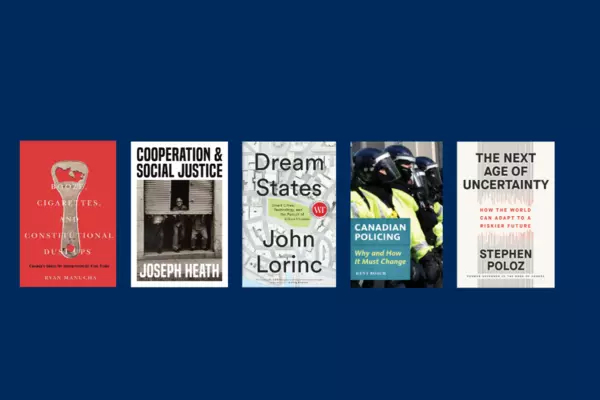
After two years of hard work in the Munk School’s Master of Public Policy (MPP) program, graduate Riley Garno is living the dream.
Through the connections he made during the MPP program’s speed networking event in Ottawa this past February, Garno has recently started a position with the Public Health Agency of Canada (PHAC) working on increasing vaccine uptake among equity-deserving groups such as racialized Canadians and Indigenous communities.
“It’s a challenge I’m excited to take on,” says Garno, who has an interest in “doing upstream interventions from an equity and social determinants of health perspective.”
“I want to address inequities in advance so they don’t turn into life-altering health crises in the future.”
It’s a position that mixes Garno’s interest in equity, diversity and inclusion (EDI) with his passion for public policy, and he is delighted to be part of this particular team.
“My new position offers me an opportunity to expand my work with data and to improve policy through evaluation, so I can continue to grow.”
A few years ago, working with data was the furthest thing from Garno’s mind. He was working in EDI at the University of Windsor but hoped to eventually move to a field that combined his passion for EDI with his undergraduate degrees from Western University: an Honours BA in political science and an Honours BHSc in health promotion. He decided that a master’s degree in public policy with a collaborative specialization in public health policy would be a perfect way to achieve that goal and explored the options. In doing so, Garno discovered that many fellow students had followed that path and found that it opened doors. He also realized that the emphasis on quantitative methods would give him a skill set that few other programs could offer – an observation that was borne out through experience.
“I did an internship at the Ontario Ministry of Labour, Training and Skills Development and there were students from other universities doing internships, but they didn’t have the same level of knowledge we had in many areas, such as quantitative methods.”
In general, Garno was delighted by the breadth of subjects available at the Munk School that allowed him to “delve a bit deeper” into topics of interest, and he appreciated the experiential education opportunities provided by the MPP. His ‘Strategic Policy Implementation course, for example, required him to work on a policy problem with a group of classmates and create an implementation plan that they presented to someone with practical experience in policy for critique.
“The Munk School has amazing resources,” Garno says. “Through their graduates and partnerships, we had access to the best and brightest with their thumbs on the policy pulse – people who had done pretty amazing things. It’s inspiring to see what we can do in the future.”
For his Capstone course, Garno worked on a report illustrating how he would implement a suite of three policy options that would create a safe, accessible, and appropriate long-term care system, applying all the skills he had learned in the program.
“Even if it seemed a bit overwhelming, it showed that we could do some pretty incredible things if we had the right data and worked as a team.”
Garno found his MPP background very useful in his internship and expects it to serve him well throughout his career. “The MPP opens doors,” Garno says. “I can talk to anyone in the civil service and understand how they go about things, because I speak their language, know the tools they use, and understand government processes. I don’t feel like an outsider speaking to such incredible people.”



